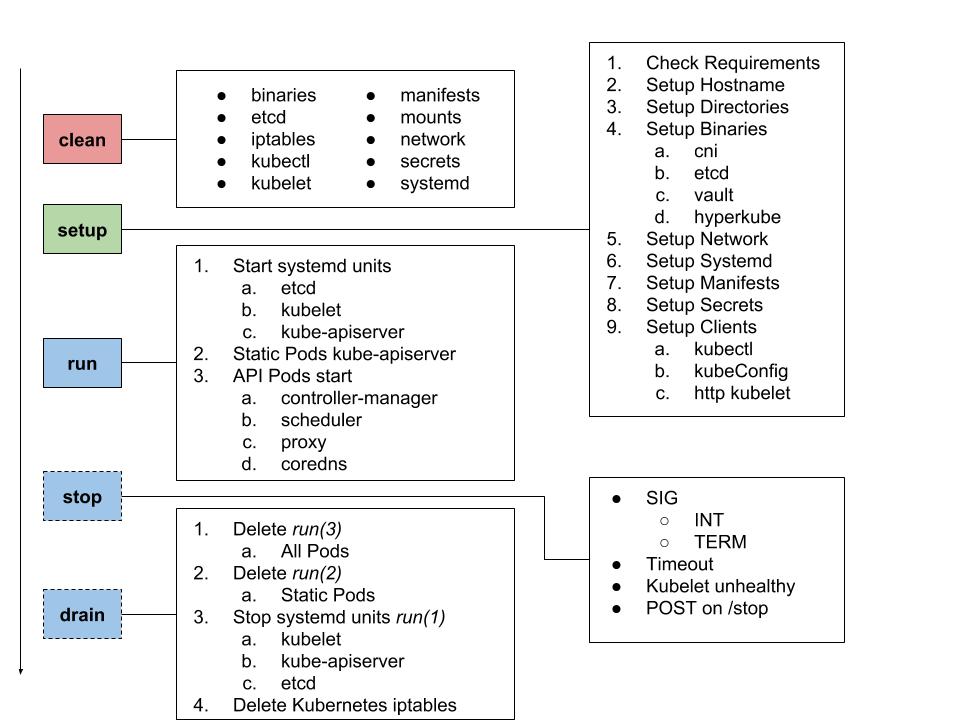DataDog / Pupernetes
Programming Languages
Projects that are alternatives of or similar to Pupernetes
pupernetes - p8s
pupernetes (a play on “Kubernetes” and “puppy”) is a tool written at Datadog for spinning up a full-fledged Kubernetes environment for local development and CI environments similar to other tools like minikube but with a few more features. pupernetes was originally designed to perform e2e testing of the Datadog Agent.
Table of Contents
Features
The goal of pupernetes is to be a smarter "Makefile" to setup, run, and clean up a full-fledged Kubernetes environment using any combination of the supported versions of Kubernetes, etcd, container runtime, and CNI plugin to validate any software project on top of it. Additionally, pupernetes provides user-friendly features like:
- Probing the control plane components (including
coredns) during startup so you can usekubectlimmediately after pupernetes has started. - Complete clean up of the Kubernetes environment to leave your laptop in the same state it was in before running pupernetes.
Provides:
- etcd v3
- kubectl
- kubelet
- kube-apiserver
- kube-scheduler
- kube-controller-manager
- kube-proxy
- coredns
- containerd (if specified with
--container-runtime=containerd)
The default setup is secured with:
- Valid x509 certificates provided by an embedded vault PKI
- Able to use the Kubernetes CSR and the service account root-ca
- HTTPS webhook to provide token lookups for the kubelet API
- RBAC
You can use pupernetes to validate a software dependency on Kubernetes itself or just to run some app workflows with argo.
As pupernetes runs in travis and circle-ci, it becomes very easy to integrate this tool in any Kubernetes project.
Requirements
Runtime
Executables
tarunzipsystemctl-
systemd-resolve(or a non-systemd managed/etc/resolv.conf) mountiptablesnsenter-
libseccomp2(if using containerd)
Additionally any implicit requirements needed by the kubelet, like the container runtime and more.
Currently only reporting docker, please see the current limitations.
Docker
If you're using Docker as the container runtime, you must already have Docker installed.
Systemd
A recent systemd version is better to gain:
systemd-resolvejournalctl --since- more convenient dbus API
Resources
- 4GB of memory is required
- 5GB of free disk space for the binaries and the container images
DNS
Ensure your hostname is discoverable:
dig $(hostname) +short
Development
pupernetes must be run on linux (or linux VM).
Please see our ubuntu 18.04 notes about it.
To compile pupernetes, you need the following binaries:
-
go1.10 make
Build
go get -u github.com/DataDog/pupernetes
cd ${GOPATH}/src/github.com/DataDog/pupernetes
make
Getting started
Download
You need to download the last version:
VERSION=0.12.0
curl -LOf https://github.com/DataDog/pupernetes/releases/download/v${VERSION}/pupernetes
chmod +x ./pupernetes
./pupernetes --help
Run
sudo ./pupernetes daemon run /opt/sandbox/
Note:
kubectlcan be automatically installed by pupernetes.You need to run the following command to add
kubectlto the$PATH:sudo ./pupernetes daemon run /opt/sandbox/ --kubectl-link /usr/local/bin/kubectl
$ kubectl get svc,ds,deploy,job,po --all-namespaces
NAMESPACE NAME TYPE CLUSTER-IP EXTERNAL-IP PORT(S) AGE
default kubernetes ClusterIP 192.168.254.1 <none> 443/TCP 3m
kube-system coredns ClusterIP 192.168.254.2 <none> 53/UDP,53/TCP 3m
NAMESPACE NAME DESIRED CURRENT READY UP-TO-DATE AVAILABLE NODE SELECTOR AGE
kube-system kube-proxy 1 1 1 1 1 <none> 3m
kube-system kube-scheduler 1 1 1 1 1 <none> 3m
NAMESPACE NAME DESIRED CURRENT UP-TO-DATE AVAILABLE AGE
kube-system coredns 1 1 1 1 3m
NAMESPACE NAME READY STATUS RESTARTS AGE
kube-system coredns-747dbcf5df-p2lhq 1/1 Running 0 3m
kube-system kube-controller-manager 1/1 Running 0 3m
kube-system kube-proxy-wggdn 1/1 Running 0 3m
kube-system kube-scheduler-92zrj 1/1 Running 0 3m
Stop
Gracefully stop it with:
- SIGINT
- SIGTERM
--timeoutcurl -XPOST 127.0.0.1:8989/stop
Hyperkube versions
pupernetes can start a specific Kubernetes version with the flag --hyperkube-version=1.9.3.
These are the current supported versions:
- [x] 1.18
- [x] 1.17
- [x] 1.16
- [x] 1.15
- [x] 1.14
- [x] 1.13
- [x] 1.12
- [x] 1.11
- [x] 1.10
- [x] 1.9
- [x] 1.8
- [x] 1.7
- [x] 1.6 (experimental)
- [x] 1.5 (experimental)
- [ ] 1.4
- [ ] 1.3
Container runtimes
pupernetes can start a specific container runime with the flag --container-runtime=docker. The default is docker.
These are the current supported container runtimes:
- Docker
- containerd (experimental)
Systemd as job type
It's possible to run pupernetes as a systemd service directly with the command line. In this case, pupernetes asks to systemd-dbus to be daemonised with the given arguments. See more info about it in the run command.
This command line is very convenient to run pupernetes in SaaS CI:
Command line docs
The full documentation is available here.
Metrics
pupernetes exposes prometheus metrics to improve the observability.
You can have a look at which metrics are available here.
Current limitations
- Systemd
- Currently working with systemd only
- Could be containerized with extensive mounts
- binaries
- dbus
- Support for Custom Metrics
- You can register an API Service for an External Metrics Provider. This is only supported for 1.10.x and 1.11.x.

